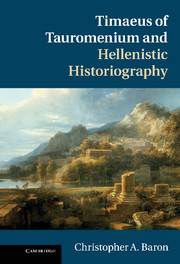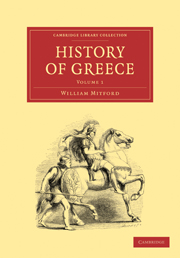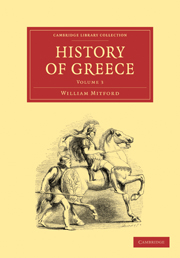Timaeus of Tauromenium and Hellenistic Historiography
Timaeus of Tauromenium (350–260 BC) wrote the authoritative work on the Greeks in the Western Mediterranean and was important through his research into chronology and his influence on Roman historiography. Like almost all the Hellenistic historians, however, his work survives only in fragments. This book provides an up-to-date study of his work and shows that both the nature of the evidence and modern assumptions about historical writing in the Hellenistic period have skewed our treatment and judgement of lost historians. For Timaeus, much of our evidence is preserved in the polemical context of Polybius' Book 12. When we move outside that framework and examine the fragments of Timaeus in their proper context, we gain a greater appreciation for his method and his achievement, including his use of polemical invective and his composition of speeches. This has important implications for our broader understanding of the major lines of Hellenistic historiography.
- Provides the basis for a re-evaluation of Greek historical writing in the Hellenistic period, using Timaios as a case study
- Will be of interest to students of ancient historical writing in all periods, in both Greek and Latin
- Establishes a firm methodological approach to studying fragmentary texts
Reviews & endorsements
'Baron has produced a highly readable and engaging study … this book is certain to play an integral role in future discussions of Hellenistic historiography.' Liv Mariah Yarrow, Bryn Mawr Classical Review
Product details
December 2012Hardback
9781107000971
316 pages
229 × 152 × 19 mm
0.59kg
3 tables
Available
Table of Contents
- 1. How to study a fragmentary historian
- 2. Timaeus' life and works
- 3. Timaeus' legacy: Rome and beyond
- 4. The distorting lens: Polybius and Timaeus
- 5. A stranger in a strange land? Timaeus in Athens
- 6. Polemical invective and the Hellenistic historian's craft
- 7. The missing link? Pythagoras and Pythagoreans in Timaeus
- 8. 'Just like a schoolboy': Timaeus and his speeches
- 9. Generic choices: the shape of Timaeus' Histories
- 10. Herodotean historiography in the Hellenistic age
- 11. Conclusion
- Appendix A. New delimitations or translations
- Appendix B. Philodemus, On Poems and Timaeus T 15b.





